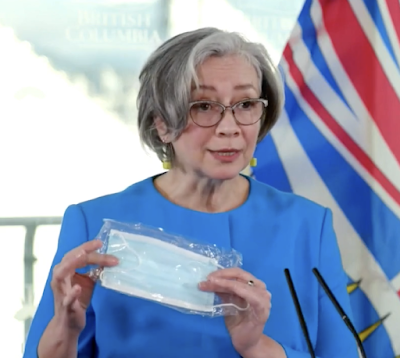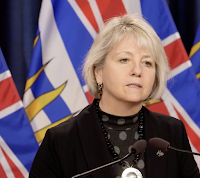With Doctor Henry expressing a sense of that narrative of the current response at the outset of today's session.
"As I don't need to say today, SARS-CoV-2 or what causes COVID-19 continues to persist, to evolve and of course to surprise us in many ways. We cannot predict with certainty exactly what is going to happen, and we've seen that as things have evolved over this last two years.
But we can and we must make educated, or informed guesses, or decisions based on the imperfect information we do have.
It's not mathematical certainty, but it is based on the best information that we have, the best information from what we know from history around different coronaviruses and other infections around immunology and around what we're seeing around the world.
It is the best information we have, but it is by necessity imperfect and in that context that is where we are moving ahead now with how we are going to manage to get through this next wave, the omicron wave here of the pandemic"
Towards getting through the Omicron wave, Doctor Henry noted how the pace of infection has increased and how everybody knows somebody, or has someone in their close circle, who has been affected by COVID-19 something she noted that will make for a challenging month.
The Doctor observed of the goal, as it has been from the start of COVID, to mitigate the impact of the virus. To make sure the province is doing the best to stop sickness and death and to support the health care system to allow for everyone can get the care they need and to minimize the negative impacts of everything that we are doing to society.
As she did earlier in the week, the Public Health Officer, focused on the need to follow the current health advice, including social distancing and vaccination and the need to return to the days of the COVID business safety plans which will help the province's commercial sector and other organizations to ride this wave of the coronavirus.
Towards those measures, today delivered the latest Public Health Order that now once again requires the need for COVID-19 Safety Plans. With Doctor Henry directing employers to WorkSafe BC for assistance towards those requirements.
"These are the plans that saw us through up to now, includes such things as barriers and reduced crowding and making sure we can reduce the mixing of staff if need be. Working from home if that's possible and facilitating workers staying home if they are ill"
Those measures are not in effect for the education sector, which will have their own specific measures in place as the classroom setting return next week.
The background towards those measures would fall to Education Minister Jennifer Whiteside to relay a bit later in the session.
To finish her part of the presentation, Doctor Henry spoke the province's approach to testing for COVID, with a particular focus now to be directed towards health care workers in acute care settings in remote, rural and Indigenous and other vulnerable communities to be able to tell when Omicron in particular is entering those communities and support those communities.
In coming weeks the province expects more rapid tests to arrive from Ottawa, as well they have plans to introduce the rapid tests into the school system in order to support the K-12 system on outbreak management.
The use of tests however is something that the province plans to control tightly, with a specific use in priority areas and uses.
"We have made significant progress deploying these tests despite challenging winter weather and all the other things that have been throw at us over this holiday season ... we expect our supply of tests to increase in the weeks ahead and just yesterday we were advised by Canada that we are getting a number in, hopefully by mid next week which would be good news.
As our supply increases and as we go into the next few months we'll be able to expand it for symptomatic people and for people to be able to do that type of testing at home. But the key focus in the coming week will be as I said on supporting K-12 and the return to school
Education Minister Jennifer Whiteside expanded on the Return to class plans to launch on Monday, observing how there will be enhanced safety measures in place at schools including staggered break times, virtual assemblies, and visitor restrictions.
She highlighted the ability of the Education system to adapt to the changing pandemic, working through this week towards the restart of school.
 |
| Education Minister Jennifer Whiteside shows one of the masks that School Districts across BC will have on hand for use on Monday |
The Minister also outlined how schools will have access to three-layered masks, though those masks do not appear to be of the N-95 variety that has been one of a number of calls from the provincial teachers federation the BCTF.
"So on Monday, schools will be open with reinforced safety measures in place, including the provision of three layered disposable masks, which are the masks that look like these ones.
And those are the masks that we have been providing in schools throughout the pandemic and we've worked to ensure that Districts have a good supply of those masks.
There will be measures to reduce crowding, to stagger break times, we will be shifting to virtual assemblies, virtual staff meetings, we will be restricting visitors to schools for the time being.
And I ... would like to say about masks, that we know, that we've been advised by public health of course that masks are an important layer of protection and that students and staff will continue to use this important layer of protection. while they're in schools.
And so what Monday will look like when students come back to class, is a refresher on the proper way to use a mask, the importance of using a mask, how it can help keep everybody safe as well as a refresher on the overall safety plan"
The Minister also stressed the importance of the daily health checks and the need to stay home if anyone has any symptoms. Noting how this new year brings a very different look to what has been in place before, with contract tracing no longer a helpful tool with a shift to following school attendance and the results to be forwarded to public health for further investigation..
Health Minister Dix provided for a breakdown on the latest hospitalization levels and use of critical care beds in this first week of January, as well as to outline the latest notes on the first, second and booster dose campaigns on vaccination.
The full presentation from this morning, including the range of questions from the media can be reviewed below:
Since education was destined to make for most of the focus for the morning session, the BCTF had already put forward some suggestions and observations on the process ahead for the restart of the schools for 2022.
BCTF President Teri Mooring was quick to relay the Teachers' Federation view of the latest notes from the province shortly after the morning information session.
Ms Mooring Addressed a number of the themes relayed by the Education Minister and Dr. Henry, observing that the plan outlined still requires more to keep staff and students safe, included on the list concerns over needed work on classroom infrastructure and the current level of vaccination of school age children.
More notes on the COVID-19 response is available from our archive page here.


No comments:
Post a Comment